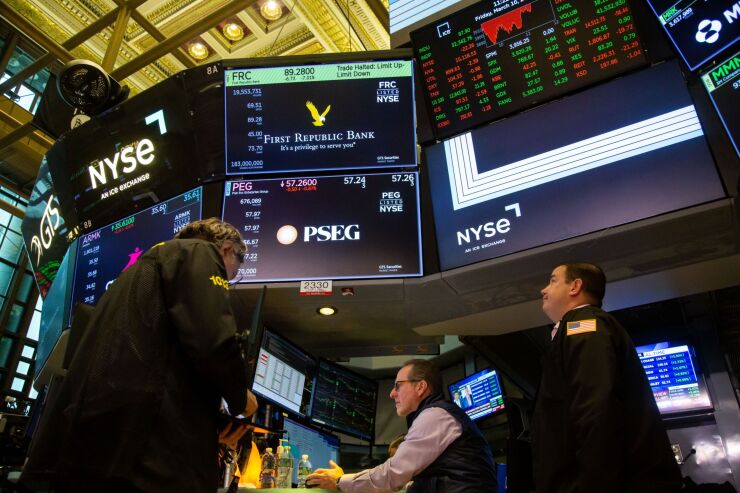
Fears about some regional banks' financial footing persisted on Monday, despite an effort by federal regulators and President Biden to quell concerns from depositors and avert a panic.
Shares in several midsize banks that have drawn scrutiny over the past few days fell sharply once again on Monday. The KBW Nasdaq Bank Index, which serves as an industry benchmark, was down 11.25% in late afternoon trading. Trading in a few stocks was paused amid the volatility.
Shares in First Republic Bank, a San Francisco-based bank that
Western Alliance, a Phoenix-based lender that released a similar update for investors Monday, has fallen around 51% since Friday's open.
Shares in both of those banks had
Other banks that have seen large losses since Friday include Zions Bancorp. in Salt Lake City, which was down 19%; Comerica in Dallas, which was down 27%; Huntington Bancshares in Columbus, Ohio, which has slid 17%; and First Horizon in Memphis, Tennessee, which was down about 19%.
Customers Bancorp has fallen about 31% since Friday's open, while KeyCorp has dropped about 26% and the Bank of Hawaii has sunk about 20%.
Investors' negative reaction was largely "fear-based" and somewhat surprising, said Alexander Yokum, an analyst at CFRA Research. Yokum said he expected regulators' actions on Sunday to be "a little bit more supportive" of banks' share prices, noting that the Federal Reserve announced a backstop Sunday that will take on banks' high-quality yet underwater bonds.
"A good portion of banks, once this slows down, I do think will rally strong," Yokum said. "The question, of course, is will other banks go down. If you don't go down, I think there's a very high chance you'll have a good few months following this."
Earlier in the day, Biden sought to calm nerves in the markets,
Investors appear to be taking a harder look at risks tied to specific banks, and are trimming or eliminating their exposures, said Brad McMillan, chief investment officer at Commonwealth Financial Network.
Federal regulators have "taken a very deliberate approach to protect the depositors" at the banks that have failed, McMillan said in an interview. But the regulators have left bank investors on the hook.
"As long as they can limit the overall economic impact, I think to some extent, they're willing to let the equity holders take those risks," McMillan said.
Western Alliance, a $67 billion-asset bank, said in a statement Monday that it has "taken additional steps to strengthen its liquidity position" to ensure that it can meet its clients' funding needs. The bank's cash reserves of more than $25 billion are growing, and more than half of its deposits are insured, it said.
East West Bancorp., a Pasadena, California, bank with $64 billion of assets, said in its own investor update that it's "conservatively managed, and we have strong liquidity."
"In light of recent industry events and market volatility, we reiterate that East West Bank's business model is diversified, our balance sheet is managed conservatively, and our liquidity is strong," Dominic Ng, the bank's chairman and CEO, said in a statement Monday. "Our industry-leading profitability and our high-quality earnings have resulted in very strong capital levels, which form a firm foundation for our bank."

The nation's four largest banks were all in the red on Monday, but they experienced more contained losses. JPMorgan Chase was down about 1.6% from its closing price on Friday; Bank of America slid about 5.7%; and Wells Fargo and Citigroup fell around 7%.
Kevin Heal, an analyst at Argus Research Group, said he hopes the worries remain "well contained." With regulators signaling that banks' uninsured deposits may be effectively guaranteed, large banks and some regionals should be able to "weather the storm," he said.
Jordan Stutts contributed to this report.





